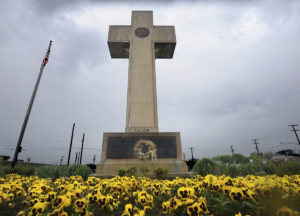The United States Supreme Court ruled June 20 that a 40-foot Latin cross can remain on public land as a historical symbol of war.
Writing for a 7-2 majority, Justice Samuel Alito said while the “cross has long been a preeminent Christian symbol,” by the time the American Legion dedicated the Peace Cross in Bladensburg, Maryland, in 1925, the white cross had become a common symbol to memorialize soldiers killed in World War I.
 With the passage of time, the majority said, removing such historically significant symbols “may no longer appear neutral, especially to the local community for which it has taken on particular meaning.”
With the passage of time, the majority said, removing such historically significant symbols “may no longer appear neutral, especially to the local community for which it has taken on particular meaning.”
“A government that roams the land, tearing down monuments with religious symbolism and scrubbing away any reference to the divine will strike many as aggressively hostile to religion,” Justice Alito wrote. “Militantly secular regimes have carried out such projects in the past, and for those with a knowledge of history, the image of monuments being taken down will be evocative, disturbing and divisive.”
Rachel Laser, president and CEO of Americans United for Separation of Church and State, denounced the decision as “misguided.” She described the Bladensburg cross as “an inherently Christian symbol that excludes thousands of non-Christian veterans and ignores the tremendous sacrifices they made.”
“Just because something is a tradition doesn’t make it right,” Laser said. “In 2019, the court ought to know better than to permit the government to continue causing harm and violating our constitutional principles just because we’ve always done it that way.”
The Baptist Joint Committee for Religious liberty filed a friend-of-the-court brief in January urging the Supreme Court to uphold a lower court’s ruling that the monument “has the primary effect of endorsing religion and excessively entangles the government in religion.”
BJC General Counsel Holly Hollman said Thursday the Supreme Court’s “splintered decision shows how difficult it is to reconcile the government’s promise of religious liberty for all while upholding a massive Latin cross on government land.”

Holly Hollman
“BJC is pleased that the court did not accept the extreme arguments put forth by the government and its allies,” Hollman said. “The court did not abandon the First Amendment’s promise of neutrality among faiths. It also specifically acknowledged the cross as a Christian symbol, not a universal symbol of sacrifice.”
“Important for our pluralistic society, the decision does not support the constitutionality of Christian-only monuments sponsored by government today,” she said.
The Ethics & Religious Liberty Commission of the Southern Baptist Convention signed onto a friend-of-the-court brief with several other religious organizations asking that the cross not be dismantled.
ERLC head Russell Moore said on Twitter the court issued “a good decision” in allowing the memorial to remain.
“Maintaining a nearly century-old war memorial at a busy intersection is hardly an official declaration in law that Christianity is the government’s preferred religion,” the ERLC brief said in part. “And the small financial cost of its maintenance — for the benefit of an organization that is not even a church — is a far cry from the public support for established churches during and preceding the founding era.”
Previous stories:
Supreme Court takes up its cross to test the wall separating church and state
Baptist group says cross is not secular, and government has no business sponsoring its display
